Below is a transcription of the video available YouTube and StephenHicks.org.
Philosophy and a Century of War (transcription)
Stephen R. C. Hicks

Philosophy has a reputation for being abstract and difficult, which it certainly can be. It also has a reputation for being impractical, which it definitely is not. So today I want to give you one reason to believe that philosophy makes a life and death difference.
To begin, let us consider the twentieth century, which was a warlike century. Here is a list of major wars of the twentieth century:
Word War I — it began in 1914 and ended in 1918
World War II began in 1939, ended in 1945.
What those two wars have in common is that most of the world´s major powers were going at it, with tens of millions of people dead over extended years.
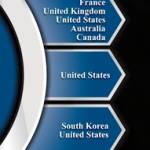
The Cold War is usually dated from 1947 to 1991, with the collapse of the Soviet Union. Sometimes it is dated from 1946, with Winston Churchill´s famous “Iron Curtain” speech.
The Korean War, from 1950 to 1953.
Then the Vietnam War, which certainly looms large in the American consciousness, from 1959 to 1975.
Next consider who was fighting in each of these major wars.
Let’s go back to World War I. On the allied side, we have Great Britain. We have France. Along with Great Britain, we have most of the Commonwealth countries participating: Canada, India, Australia, New Zealand, and so forth. A little later in the war, the United States joins in.
On the other side of the war, we have the so-called Central Powers, led primarily by Germany, and then the Austro-Hungarian Empire, and then further to the east, the Turkish or Ottoman Empire was involved.
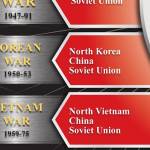
World War II: Again on one side we have Great Britain, most of the Commonwealth nations, France, and of course the United States. On the other side of the divide, again we have Germany, and this time its allies are Italy and, from the far east, Japan.[1]
Moving on to the Cold War, which lasted for most of the second part of the twentieth century. The two primary belligerents in this case are the United States against the Union of Soviet Socialist Republics (USSR).
Moving on to the Korean War, which began in 1950. This war is primarily North Korea, with behind-the-scenes support, and sometimes explicit support, from China and the Soviet Union. And on the other side of the war we have South Korea, explicitly allied with the United States.
Now we jump ahead to the Vietnam War. Here again we have a north versus south battle. North Vietnam with support from China and again the Soviet Union. South Vietnam again with support from the United States of America.
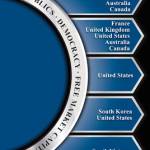
Now, let us consider the countries on the left side of the list — that is, the ones that are consistently allies over the course of the twentieth century — and ask: “What kind of political and economic systems do they embody?”
Here are the countries primarily involved: the United States, Great Britain, Canada, Australia, New Zealand, France, and so on. What all of them have in common is that they are broadly free-market capitalist economic systems and politically they are all democratic and republican.
Now, let us consider the nations on the other side of the divide, those on the right side of the chart that we are constructing here. Germany, in 1914, was an authoritarian empire, as were the Austro-Hungarian Empire and the Ottoman Empire. By the time of World War II, Germany had become a national socialist regime. Its ally, Italy, was a fascist regime, and the Japanese political system at that time was a militaristic, authoritarian regime.
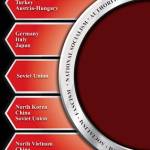
If we move on to the Cold War, the primarily belligerent against the United States is the Soviet Union. This is a war — it´s “cold” — but it extends over the globe, and the Soviet Union is a communist regime or international socialist regime.
If we move on to the Korean War, North Korea wanted to become communist and it was getting support from the communist Chinese as well as support from the communist Soviet Union.
Moving on to the Vietnam War, which began in 1959 and accelerated through the 1960s. North Vietnam wanted to become communist and they were, again, getting support from the communist Chinese and the communist Soviet Union.
So, to summarize: What we have consistently on one side of the divide is a network of countries more-or-less consistently committed to free-market capitalism economically and democratic and republican forms of government politically. On the other side of the divide, what we have is a network of countries more or less consistently committed to authoritarian forms of government, national socialist forms of government, international socialist forms of government, otherwise known as communist, or fascist forms of government.
Now, let us ask about the theory of free-market capitalism, democracy, and republicanism: Who are the big names intellectually behind the development and advocacy of the theoretical principles involved in those kinds of political and economic systems?


Obviously, many names can be mentioned, but three of the most prominent to be mentioned in this connection are John Locke, Adam Smith, and John Stuart Mill. I would first mention all three of them. John Locke is famous for giving a strong natural rights argument for a broadly free-market, democratic-republican kind of political system. John Stuart Mill is famous for giving a more utilitarian argument for a liberal capitalist kind of society. Adam Smith, of course, is the great name involved in developing the first generation of free-market economics with his On the Wealth of Nations, published in 1776.


Now, let us ask the same question on the other side. When we think about socialism, communism, and more authoritarian forms of government, what big-name intellectuals are most associated with developing those ideas in the modern world? Again, many names could be mentioned, but three of the most prominent ones that should be mentioned are Georg Hegel, Karl Marx, and Friedrich Nietzsche. Hegel wrote in the early part of nineteenth century, Marx wrote in the middle part of the nineteenth century, and Nietzsche wrote toward the end of the nineteenth century.
Now, let us ask the follow-up question: What do John Locke, Adam Smith, and John Stuart Mill all have in common? Two things. All three of them are British and all three of them are philosophers. All three of them are part of a broad movement of intellectuals that dominated British philosophy and cultural life — and, by extension, those nations that were influenced by British intellectual culture — from the end of the seventeenth century on through the end of the nineteenth century.
And now let us ask the same on the other side: What do Georg Hegel, Karl Marx, and Friedrich Nietzsche have in common? All three of them are German intellectuals and all three of them are, again, philosophers. Karl Marx, of course, is well-known for being an economist and a political philosopher, but his Ph.D. degree was in philosophy, and he developed an entire philosophy to support his political and economic system. Friedrich Nietzsche´s degree was in classical philology, but he is most famous for his very philosophical works across a wide range of issues.
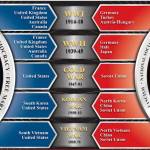
So this is why philosophy matters. One way of reading twentieth-century history with all of its wars is to point out the importance of the background philosophical collisions that played out over the course of the previous centuries. On the one hand, we have a number of nations that had broadly bought into and were applying the kind of philosophical system that had been developed by Locke, Smith, Mill, and any number of other intellectuals — fighting against a number of nations that, on the other hand, had committed to a political system based on philosophical works that had been devised by nineteenth-century German intellectuals such as Hegel, Marx, and Nietzsche.
Over the course of the 1700s and the 1800s, a philosophical debate over a wide range of issues was engaged — and, largely, British philosophers and German philosophers went down very different paths.
As British philosophy became institutionalized in a certain number of countries, broadly free-market and democratic-republican political institutions developed. As German philosophy was developed and institutionalized in different countries, more socialist, communist, and authoritarian types of systems came into place. Philosophy came to be translated into practice politically, and those colliding political systems then clashed repeatedly over the course of the twentieth century.
John Maynard Keynes famously said: “Practical men, who believe themselves to be quite exempt from any intellectual influences, are usually the slaves of some defunct economist.”[2]
Too true, John Maynard Keynes. Practical men are almost always influenced by intellectuals, and especially, economists.
But let me tweak that quotation a little and to say that behind the economists and the political philosophers stand philosophers. Philosophy, abstract philosophy, always makes a long-range practical difference when it is applied.
Notes:
[1] See my “More on philosophy and war: the Soviets in WW II” for why I did not include the Soviet Union in this discussion of WW II.
[2] John Maynard Keynes, The General Theory of Employment, Interest and Money, Chapter 24.
The “Philosophy and a Century of War” video was first posted online at Youtube and StephenHicks.org. Here is a PDF version of the transcript. Thanks to Matheus Pacini for the transcription.
Yes! Another apt quote:
“Mark this well, you proud men of action! you are, after all, nothing but unconscious instruments of the men of thought.”
– G. W. F. Hegel
Postscript to the above:
“[Hegel’s] is the subtle and penetrating mind whose dialectics inspired Marx and Lenin and thus contributed to the founding of Communism and whose ringing glorification of the State as supreme in human life paved the way for the Second and Third Reichs of Bismarck and Hitler … As one reads Hegel one realizes how much inspiration Hitler, like Marx, drew from him, even if it was at second hand. Above all else, Hegel in his theory of ‘heroes,’ those great agents who are fated by a mysterious Providence to carry out ‘the will of the world spirit,’ seems to have inspired Hitler … with his own overpowering sense of mission.”
– William L. Shirer, ‘The Rise and Fall of the Third Reich’